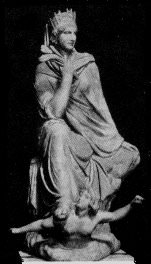T
テュケー(Tuvch)

ギリシアの運命の女神で、ディケーまたはモイラとも呼ばれていた。宇宙の運命または個人の魂の運命を司る女神であった[1]。いかなる支配者も女神テュケーの加護がなければ、支配者としての力を発揮できなかった。
 Fortune.
Fortune.
[1]Lawson, 289.
Barbara G. Walker : The Woman's Encyclopedia of Myths and Secrets (Harper & Row, 1983)
《運》の擬人化された女神。ホメーロスには見いだされないが、ヘーシオドスは彼女をオーケアノスの娘の一人に、《デーメーテール讃歌》はベルセポネーの侍女の一人にしている。しかし彼女はヘレニズム時代まではまだ抽象名詞的で、十分には人格化されなかった。この時代に彼女は量るぺからざる《運》の女神となり、ときに盲目の姿で表され、崇拝された。
彼女には神話はない。(『ギリシア・ローマ・神話辞典』)
神々は運命を凌駕していたのか、それとも、バーバラ・ウォーカーの言うように、最高神でさえも運命には従わなければならなかったのかは、古代ギリシアにおいて単純には言えない。なぜなら、両方の考えがあったからである。悲劇の父アイスキュロスにおいては、「両傾向は彼にあっては最高に明瞭に現れている」(ゴラン『ギリシア人の運命意識』p.298)。
画像出典:Sculpture of Ancient Silyonから。
Eutychides
3rd century BC
Tyche (Fortune) of Antioch, capital of Seleucids, 300 BC. Marble statuette reproduction of the original colossal in bronze made by Eutychides the Sikyonian, pupil of Lysippos. Tyche, who embodies the idea of the city, is seated on a rock. Under her feet is the river Orontes, which is represented as a swimming boy. In her hand holds stalks of grain (symbolizing prosperity) and on her head wears a mural crown, a standard attribute of later Tyche. The statue is also depicted in Syrian coins of Tigranes.

![]() Fortune.
Fortune.